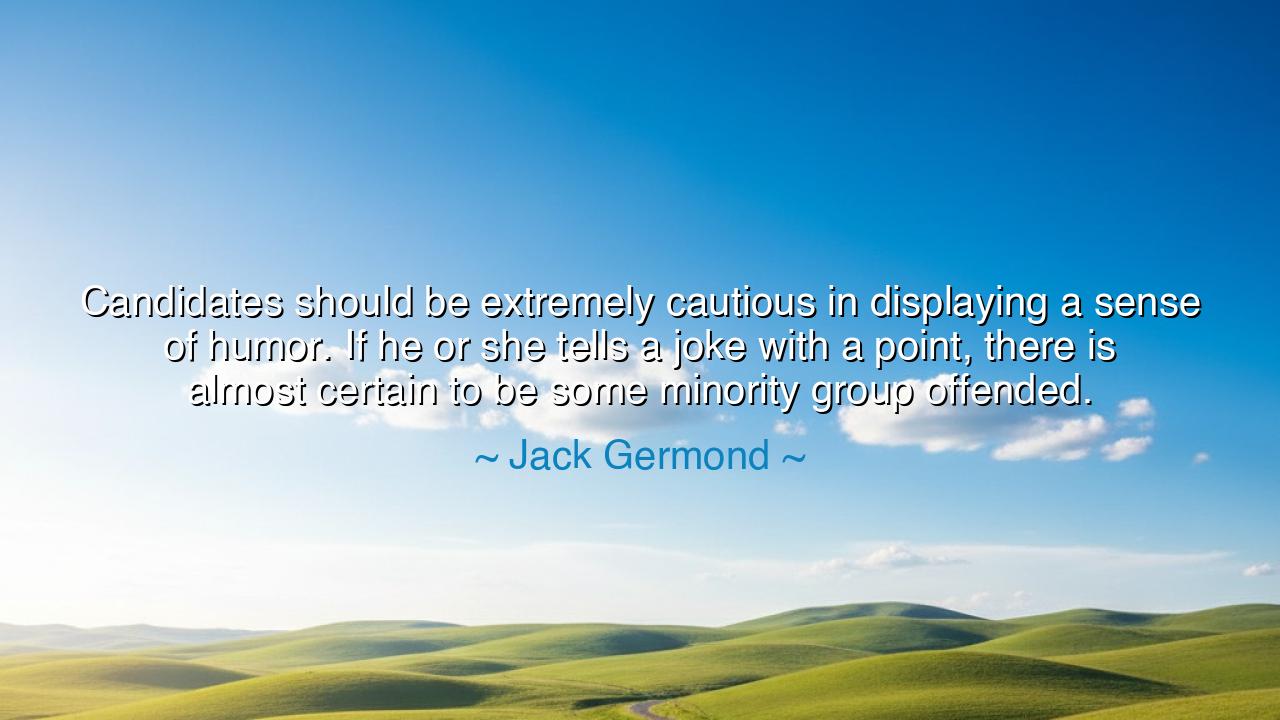
Candidates should be extremely cautious in displaying a sense of
Candidates should be extremely cautious in displaying a sense of humor. If he or she tells a joke with a point, there is almost certain to be some minority group offended.






The words “Candidates should be extremely cautious in displaying a sense of humor. If he or she tells a joke with a point, there is almost certain to be some minority group offended” by Jack Germond echo with the solemn wisdom of experience — a reflection on the delicate balance between freedom of expression and responsibility in leadership. In these words lies not merely political advice, but a profound meditation on the power of words and the fragility of human hearts. Germond, a journalist who spent decades observing the turbulent theatre of American politics, understood that in the age of public scrutiny, a single careless jest could destroy trust built over years. His warning is not against humor itself, but against the misuse of it — against the arrogance of laughter that wounds instead of heals.
To “display a sense of humor” seems harmless at first glance, yet in the realm of power, every word carries weight beyond intention. The ancient philosophers taught that speech is the mirror of the soul; to jest is to reveal one’s heart. For the private man, this may be a virtue — for laughter can disarm, unite, and show humanity. But for the leader, whose every word falls upon a thousand ears, humor becomes a blade — one that can carve harmony or division depending on how it is wielded. Germond’s counsel reflects this ancient truth: that those who lead must learn the art of measured speech, lest their wit become a weapon that cuts the very people they seek to serve.
The phrase “some minority group offended” captures the changing landscape of modern civilization — an age where voices once silent now demand dignity and respect. In ancient courts and empires, humor was the privilege of the powerful; kings laughed, and subjects bore the ridicule. But in the modern age, the balance has shifted. The jest that once drew applause may now ignite outrage, for society has awakened to the wounds that mockery can inflict. Germond’s observation is not cynicism, but realism — a recognition that the sensitivity of a diverse people is both the challenge and the beauty of democracy. To govern such a people requires not the jest of superiority, but the empathy of understanding.
History offers many lessons for this truth. Consider Abraham Lincoln, whose humor was gentle, self-directed, and wise. When accused of being two-faced during a heated campaign, he laughed and said, “If I had two faces, would I be wearing this one?” His humor disarmed his critics because it did not rise from pride, but from humility. In contrast, many leaders have fallen because their laughter was cruel — because they mistook mockery for charm. Words that sought to amuse instead exposed arrogance, and the laughter of a crowd turned swiftly into silence. Germond’s warning, then, is not merely political but moral: that humor without compassion breeds division, while humor rooted in humility builds trust.
At its core, this quote speaks to the moral weight of communication in public life. To tell “a joke with a point” is to aim laughter like an arrow — and no arrow lands without a wound. The wise must ask themselves: what is the cost of my amusement? Whom do I lift, and whom do I strike? The ancients believed that the tongue is a sacred instrument — capable of blessing or destruction. In politics, where words can move nations and shape hearts, this power multiplies. Germond understood that a candidate’s wit may win applause for a moment but lose respect for a lifetime if it causes harm to even a single soul.
And yet, his counsel does not call for silence or fear. It calls for mindful humor — laughter that includes, not excludes; humor that reveals humanity, not superiority. The leader who can laugh without cruelty, who can smile without condescension, possesses a rare kind of power: the ability to make others feel seen rather than mocked. The same fire that can burn also warms; the same wit that can wound can also heal. The key lies in intention — in remembering that words are not mere sound, but echoes that live in the hearts of those who hear them.
So, dear listener, take from Jack Germond’s wisdom this enduring lesson: let your humor serve grace, not ego. Speak with awareness, laugh with kindness, and remember that every jest is a reflection of character. In your words, seek not to display cleverness, but to create connection. Whether you lead a nation, a company, or a family, guard your speech as you would your honor. For laughter that uplifts is divine — but laughter that divides is poison. True greatness lies not in the sharpness of wit, but in the gentleness of wisdom, and in the ability to bring light without casting a shadow.






AAdministratorAdministrator
Welcome, honored guests. Please leave a comment, we will respond soon